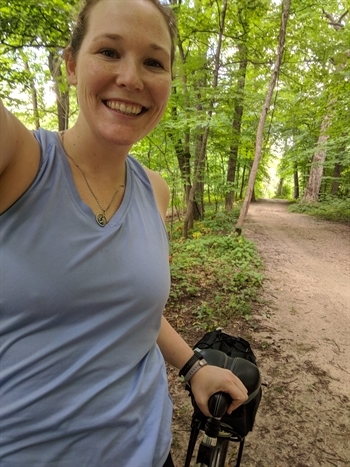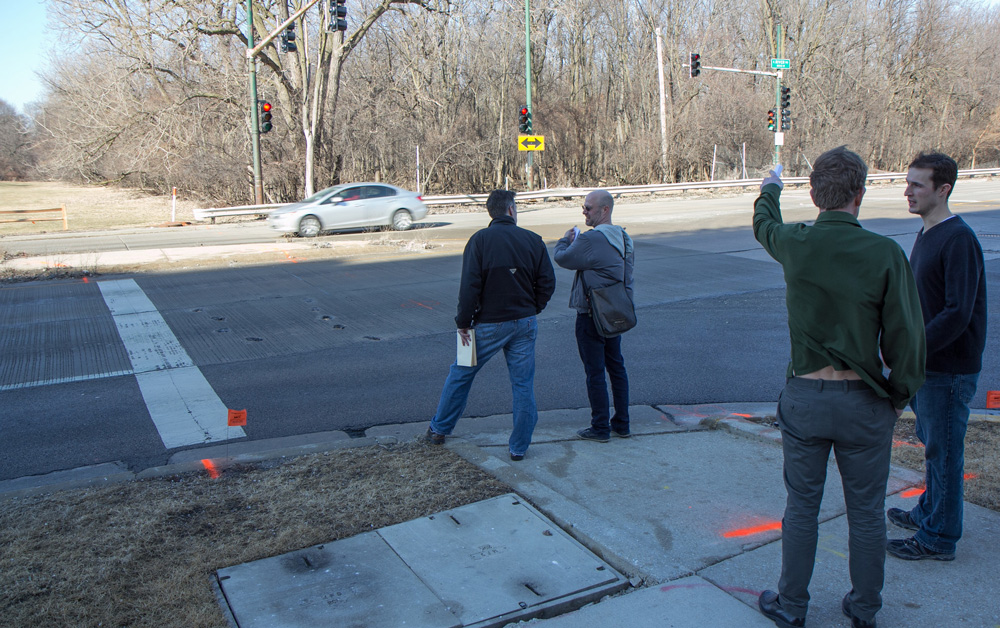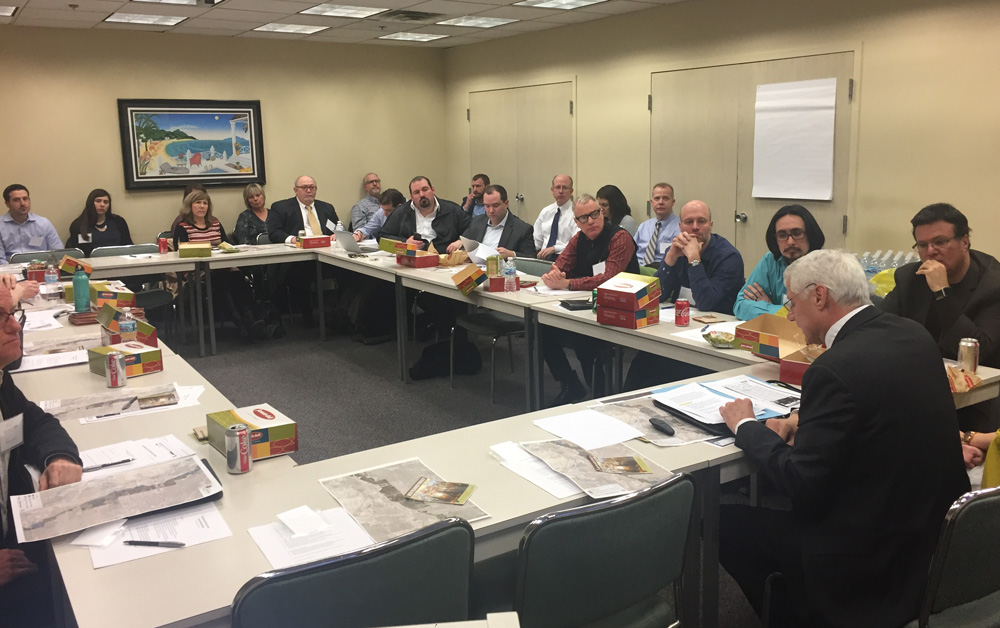Trail-blazing along the Des Plaines River Trail
By Hanna Udischas, MPC Research Assistant; edited by Chloe Gurin-Sands
The Chicago Community Trust is currently funding ten community-led riverfront projects through their Our Great Rivers grant. This piece is the eighth of a ten-part series highlighting these projects.
How Changes to the trail can improve one family’s bike rides – and more
As a young girl growing up in the City of Des Plaines, my favorite way to bike the river trail was on the back of our family’s banana-yellow tandem bike. I would prop myself up on the back seat admiring the greenery with my feet resting on the top tube, letting my dad pedal from the front seat.
Hanna riding her bike on the Des Plaines River Trail. Photo: Hanna Udischas
 Over 56 miles, the Des Plaines River Trail follows alongside Des Plaines River, winding through parts of the Forest Preserves and suburban, and rural counties from River Forest to Southern Wisconsin. The trail allows pedestrians and bicyclists to discover the County’s unique mix of forested wetlands, plains, and prairie.
Over 56 miles, the Des Plaines River Trail follows alongside Des Plaines River, winding through parts of the Forest Preserves and suburban, and rural counties from River Forest to Southern Wisconsin. The trail allows pedestrians and bicyclists to discover the County’s unique mix of forested wetlands, plains, and prairie.
As I grew older and began using the trail independently, I became aware of the intricacies of the twisting trail and the inconsistencies of its design. It is obvious that sections of the north-to-south trail were built after the roads, highways, homes and railroads it surrounds because it is commonplace to dismount or ride down strange roads to pick the trail back up. In many places, the trail is intercepted by heavy automotive traffic and flooding. Even accessing the trail from my home can prove challenging because there are not bike lanes leading to all trailheads.
Because of these barriers, simply accessing and continuing along the trail can feel stressful and unsafe. Many long-time users of the Des Plaines River Trail share similar grievances.

Crossing the street to continue along the trail. Photo: MPC
The Active Transportation Alliance (Active Trans), with funding from the Chicago Community Trust, is advocating for improved ecologic conditions and increased user safety on the Central portion of the Des Plaines River. They are building a coalition of municipalities along the river that share the vision of a vibrantly connected riverfront trail.
The central section of the trail extends from Touhy to North Avenue and is notorious for its poor wayfinding as it weaves through office and hotel parks, commercial hubs, neighborhoods, major arterial roads and the Kennedy Expressway.
The structural and ecological integrity of the trail are also of concern. The Des Plaines River is susceptible to flooding, which has left the soil along the riverbank severely eroded. This makes it difficult to keep the dirt road intact after rain and winter snow, as well as keep dry the several underpasses that bridge the trail under the street.
According to Matt Gomez, Trail Advocacy Manager at Active Trans, coalition meetings have been well-attended by members of the Cook County Commissioner’s Office and mayors of municipalities including Franklin Park, Schiller Park and Forest Park.

A Des Plaines River Trail coalition meeting. Photo: Active Transportation Alliance
“The trail has the opportunity to increase overall recreational users and commuters,” Gomez said. “By increasing accessibility by foot, municipalities realize that the river trail has amazing potential to provide these options for their residents and also give visitors the option to hop off the trail and go into their town fairly easily.”
Cook County has also prioritized improving the Central portion of the River Trail. In early fall of last year, over $1 million in funding was secured to execute an engineering study along this Central section Des Plaines River Trail from Touhy Avenue to North Avenue. The operation will receive $721,000 from the federal government and $309,000 from the Cook County Department of Transportation and Highways. Rosemont’s village board approved an intergovernmental agreement with Cook County to receive the funds to pay for the work.
As lifetime users of the Des Plaines River Trail, the news of trail improvements is very exciting to me and my family. If you are also a passionate user of the Des Plaines River Trail with ideas to share about its improvement, maintenance and future programming, consider joining the Friends of the Des Plaines River Trail, which Active Trans is working to establish.
Hanna Udischas is a former research assistant at MPC.
